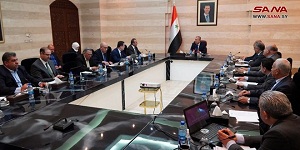Premier Arnous while presiding over the Supreme Council for Investment: Distribution of Investment projects in a way that achieves sustainable development
The Supreme Investment Council, during its meeting today, headed by Prime Minister Hussein Arnous, conducted a follow up of the investment licenses granted and the procedural progress of requests by investors wishing to obtain an investment license in accordance with the provisions of Investment Law No. 18 of 2021, as well as the projects that started implementation and benefiting from the advantages and incentives of the law, and completed the supply of work equipment.
The total number of projects granted investment permits according to the new investment law reached 25 projects at an estimated cost of 1.252 trillion Syrian pounds, providing about 2,048 job opportunities distributed in the governorates of Damascus countryside, Hama, Lattakia, Homs, Aleppo and Sweida. These projects include the fields of food industries, chemical, pharmaceutical, textile, extractive, renewable energies and laboratories.
Premier Arnous stressed the importance of distributing investment projects over the entire national geography and diversifying them to include various fields, taking into account the available capabilities in each governorate and achieving sustainable and balanced economic and social development, focusing on agricultural projects, both plant and animal, and renewable energies, and directing investors to focus their projects in industrial areas and cities due to the availability of infrastructure and logistics in them. The Prime Minister stressed the importance of follow-up of the implementation of projects in accordance with the specified time schedules.
The Supreme Investment Council reviewed a number of industrial and agricultural projects that met all the approvals and requirements to be coordinated with the location site committees which will detect and give approvals, including the manufacture of fodder, cheese and others.
The council also reviewed a group of projects that are coordinated with the Ministry of Industry to obtain an industrial license. These projects include the production of medicine, metal wires, welding rods, and the manufacture of all kinds of chargers and charging links.
The interventions focused on the need to encourage investment in the field of wind energy, agricultural industry projects, the livestock sector and animal products.
NR

